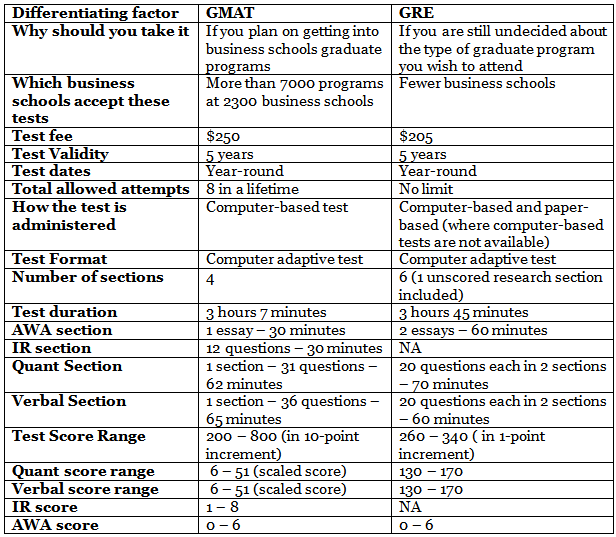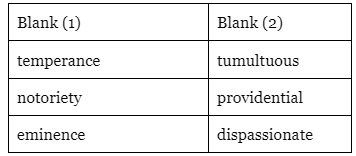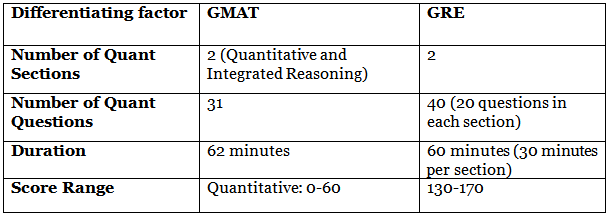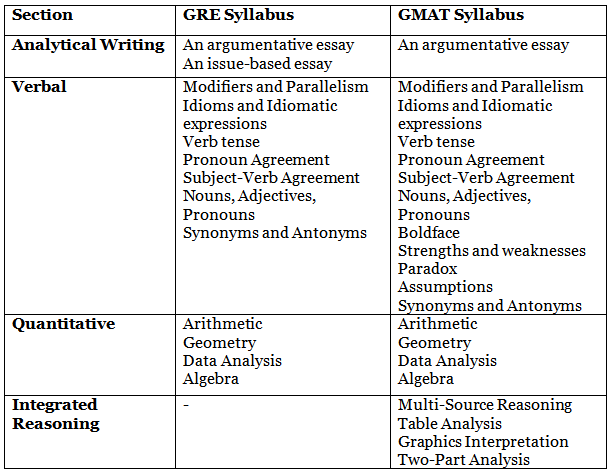GMAT vs GRE: Which should you take? PDF Download
Standardized tests like the GMAT (Graduate Management Admission Test) and GRE (Graduate Record Examination) have long been important components of the MBA admissions process. These tests serve as a measure of a candidate's academic abilities and potential to succeed in a graduate business program. However, with the increasing popularity of the GRE as an alternative to the GMAT, MBA applicants often find themselves debating which test to take. While both tests have their own unique features and benefits, it is important for prospective students to understand the differences between them and which test may be the best fit for their individual circumstances. In this article, we will explore the importance of standardized tests in MBA admissions and compare the GMAT and GRE to help you make an informed decision.
What is the GMAT exam?
The Graduate Management Admission Council (GMAC) administers the GMAT, which is a popular entrance exam for admission to business schools and MBA programs. It assesses reasoning and critical thinking abilities that are necessary to excel in top graduate business programs. Test takers can opt to retake the GMAT up to eight times in total, with a maximum of five times in a 12-month period if taking the test at a physical testing center. However, the online GMAT exam can only be taken twice in a lifetime.What is the GRE exam?
Administered by the Educational Testing Service (ETS), the GRE(Graduate Record Examinations) is widely accepted as an admissions requirement at thousands of graduate schools, including those offering business and law programs. The exam evaluates a test taker's verbal and quantitative reasoning, critical thinking, and analytical writing abilities. If one wants to retake the GRE, they can do so up to five times in any 12-month rolling period, with a minimum of 21 days between tests. Moreover, if a test taker takes the exam more than once, they can decide which scores they want to send to their target schools. There is no limit for how many times the test can be taken in a lifetime.GMAT vs GRE: Key differences
The GMAT and GRE exams are both standardized tests that colleges use for admissions, but there are distinctions between the two, which are outlined in the table below.
GMAT vs GRE: Comparing the exam sections
GMAT exam sections
The GMAT exam consists of four sections:Section | Number of Questions | Allotted Time | Scoring |
31 questions | 62 minutes | 6-51 in 1 point increments | |
36 questions | 65 minutes | 6-51 in 1 point increments | |
12 questions | 30 minutes | 1-8 in 1 point increments | |
1 essay question | 30 minutes | 0.0-6.0 in 0.5 point increments |
- The Quantitative section of the exam consists of questions are designed to test your ability to solve quantitative problems and evaluate whether you have enough information to solve a particular problem. This section covers a range of mathematical topics including arithmetic, algebra, geometry, and data analysis.
- The Verbal section of the GMAT evaluates your ability to understand and analyze written material, as well as your ability to identify and correct written errors. The questions are designed to test your skills in reading comprehension, critical reasoning, and sentence correction.
- The Integrated Reasoning section of the GMAT measures your ability to interpret and analyze complex data from multiple sources. This section is designed to test your analytical and quantitative reasoning skills, as well as your ability to evaluate information presented in different formats, including tables, charts, and graphs. The questions in this section are divided into four types: multi-source reasoning, table analysis, graphics interpretation, and two-part analysis
- The Analytical Writing Assessment (AWA) section of the GMAT is designed to evaluate your ability to think critically and communicate effectively in written form. The AWA section consists of an analysis of an argument or an analysis of an issue, which require you to analyze and evaluate complex ideas and arguments, and to express your own ideas clearly and persuasively.
GRE exam sections
The GRE exam consists of six sectionsSection | Number of Questions | Allotted Time | Scoring |
One "Analyze an Issue" task and one "Analyze an Argument" task | 30 minutes per task | 0.0-6.0 in 0.5 point increments | |
20 questions per section | 30 minutes per section | 130-170 in 1 point increments | |
20 questions per section | 35 minutes per section | 130-170 in 1 point increments | |
Unscored | Varies | Varies | - |
Research | Varies | Varies | - |
- The Analytical Writing section of the GRE consists of two distinct writing tasks, each with a duration of 30 minutes. In one task, you will be asked to develop and present your own argument on a given issue, while in the other task, you will evaluate someone else's argument on a different issue. The section tests your ability to think critically, construct persuasive arguments, and express your ideas clearly and effectively in written form.
- The Verbal Reasoning section of the GRE includes two separate 30-minute sections. The questions are divided into three types: reading comprehension, text completion, and sentence equivalence. These questions are designed to assess your ability to understand and analyze written material, and to use vocabulary effectively in context.
- The Quantitative Reasoning section of the GRE is designed to assess your fundamental math skills, and consists of two 35-minute sections. The questions may take the form of multiple-choice questions with one or more answers, numeric entry questions, or quantitative comparison questions. Topics covered in this section include arithmetic, algebra, geometry, and data analysis.
- The GRE experimental section is an unscored additional Verbal or Quantitative Reasoning section, which may replace one of the two usual Verbal sections. It is not marked or indicated on the test, so test-takers won't know which section is experimental. The purpose of the experimental section is for ETS to test the difficulty of questions it plans to use in future tests, so it is important for them to accurately predict how test-takers will perform on new questions. This section is unmarked to ensure that the new questions are on par with the difficulty level of current GRE questions.
- The GRE research section is a non-scored section that is used by ETS to test new potential questions in a real test-taking environment. Unlike the unmarked experimental section, the research section is clearly marked and always appears at the end of the test. It is also completely optional, meaning that test-takers have the choice to take it or not. In contrast, the experimental section cannot be skipped since test-takers do not know which section it is.
GMAT vs GRE, one big difference in exam sections
- In the GMAT exam, you are offered an on-screen calculator only in the Integrated Reasoning section, and not the Quantitative aptitude section, also, once a question has been answered, there is no way of going back to it for rechecking or marking it for review.
- Whereas, While taking the GRE test, you are allowed to use an on-screen calculator during the Quantitative Reasoning section. You have the flexibility to move backwards and forward through each section, change your answers, and mark questions for review if you want to revisit them later.
GMAT vs GRE: Verbal section
While the GMAT verbal section emphasizes grammar and reasoning skills, the GRE verbal section mainly assesses a test-takers vocabulary. This difference can be exemplified by a sample question from each exam, such as a GRE vocabulary question versus a GMAT grammar and reasoning question. The following examples will help clear out the difference between the verbal sections of the two exams.Text completion example of GRE
Vain and prone to violence, Caravaggio could not handle success: the more his (1)__________ as an artist increased, the more (2)__________ his life became.
Ans. Blank 1 – eminence & Blank 2 – tumultuous
Sentence correction question of GMAT
Some anthropologists believe that the genetic homogeneity evident in the world’s people is the result of a “population bottleneck”—at some time in the past our ancestors suffered an event, greatly reducing their numbers and thus our genetic variation.
(A) at some time in the past, our ancestors suffered an event, greatly reducing their numbers
(B) that at some time in the past our ancestors suffered an event that greatly reduced their numbers
(C) that sometime in the past our ancestors suffered an event so that their numbers were greatly reduced
(D) sometime in the past, our ancestors suffered an event from which their numbers were greatly reduced
(E) sometime in the past, that our ancestors suffered an event so as to reduce their numbers greatly,
Ans. GMAT sentence correction answer option (B) – that at some time in the past our ancestors suffered an event that greatly reduced their numbers
GMAT vs GRE: Quant section

The GMAT Quant section is generally regarded as more difficult than the GRE Quant section, as it emphasizes problem-solving skills and features challenging data sufficiency questions. In contrast, while the GRE allows the use of a calculator, the GMAT does not, despite the fact that the GRE Quant questions are generally considered easier than those on the GMAT.GMAT vs GRE: Syllabus
The syllabus for GRE and GMAT exams is not identical, depending on the test you decide to take. To assist you with better understanding the differences between the two, here is a comparison of the GRE and GMAT syllabus:
GMAT vs GRE: Which is easier?
- It's important to keep in mind that individual strengths and weaknesses can vary greatly, so it's not necessarily true that one test will be easier for everyone. However, as a general guide, the information you provided is accurate - the GRE quantitative section may be considered easier than the GMAT, while the GRE verbal section may be considered more challenging due to its focus on advanced vocabulary.
- Ultimately, the best way to determine which test may be easier for you is to take practice tests and assess your performance. This can give you a good idea of which areas you excel in and which areas you may need to focus on more. Additionally, consider your own testing style - for example, if you perform better with a calculator, the GRE may be a better fit for you due to its calculator allowance.
GMAT vs GRE: Which one do Business Schools prefer?
Many business schools may state that they do not have any particular preference regarding scores on the GMAT or GRE, the fact remains that more than 90% of applicants submit their GMAT scores. What is the reason for this?There are three explanations for this:
- The GMAT is designed to evaluate skills that are important for success in an MBA program and also to help admission committees be able to identify candidates that will not only be able to gain admission, but also be able to complete their studies.
- Submitting a GMAT score gives business schools an idea of the applicant's clarity of their career goals. Whereas the GRE is accepted for other graduate programs, submitting a GRE score may make admission committees question the applicant's certainty in regards to pursuing a business graduate program.
- Most business schools are more familiar with evaluating GMAT scores, as they are more comfortable interpreting them. Furthermore, it is possible that some business schools may even convert GRE scores to GMAT scaled scores in order to compare them with all the applications they receive.
Those are all valid points that may contribute to why more applicants choose to submit GMAT scores than GRE scores for MBA admissions. Here are some additional reasons to consider:
- Tradition: The GMAT has been the standard test for MBA admissions for many years, and many applicants may simply be more familiar with it or believe that it is more prestigious.
- Targeted preparation: Because the GMAT is specifically designed for business school admissions, there are many resources available to help applicants prepare for the test and tailor their study efforts towards the skills and knowledge areas most relevant to MBA programs.
- Admissions criteria: While many business schools do accept GRE scores, some may have slightly different admissions criteria for GRE applicants, such as higher minimum scores, to ensure that GRE applicants have the same level of readiness for the MBA program as GMAT applicants.
Ultimately, the decision to take the GMAT or GRE should be based on your individual strengths and goals, as well as the admissions requirements of the business schools you are considering.
GMAT vs GRE: Which one should you take?
Although the vast majority of business school applicants opt for the GMAT over the GRE, it is still common for business schools to accept GRE scores as part of their admissions requirements, meaning you can choose the test that will better demonstrate your academic strengths. Here are some factors to consider when making the decision that is right for you. - Academic goals: If you are considering different graduate programs or keeping your options open, the GRE is accepted in a more varied array of degree programs. If you are certain that you want to attend business school, taking the GMAT can show your commitment to the program, as it has been designed specifically for business school admissions.
- School requirements: Many schools accept either score, but you should verify admissions requirements beforehand. If possible, speak to an admissions representative to ask if they have a preference between the two tests.
- Academic strengths: If your math capabilities are stronger than your verbal skills, the GMAT might provide a better chance to display those strengths. If you are a strong writer, the GRE may be the more suitable option. Due to the vocabulary involved, the GRE can be more difficult for those who are not native English speakers.
- Testing style: The GRE exam format allows test takers to have the freedom to go back and review their answers, which can be beneficial for those who like to skip around and review their answers. This flexibility can provide a greater sense of confidence for those taking the exam.
- Career goals: Knowing your career goals can help you plan ahead when deciding when to take the GMAT. If you have certain companies in mind that you would like to work for, it would be beneficial to research any GMAT requirements they have as part of their job application process. Taking the GMAT before business school may save you from having to take it during your job search if required by employers. This can help make your job search process easier and more efficient
Also read: GMAT Vs CAT: A Detailed Comparison
Frequently Asked Questions (FAQs) about GMAT and GRE exams
What is the GMAT exam?
The GMAT is a standardized test that is used as part of the MBA application process. It consists of four sections, with a possible score range of 200 to 800 points in 10-point increments. The test can be taken multiple times throughout the year, with a maximum of 5 times in a year and 8 times throughout a person's lifetime.
What is the GRE exam?
The GRE (Graduate Record Examination) is a standardized test that is used to evaluate the readiness of students for graduate-level academic programs. The GRE is administered by Educational Testing Service (ETS), and is widely used by graduate schools and business schools around the world as part of their admissions process.
The GRE consists of three sections: Verbal Reasoning, Quantitative Reasoning, and Analytical Writing. The Verbal and Quantitative Reasoning sections are each scored on a scale of 130 to 170, in one-point increments.
What is the most difference between GMAT and GRE?
The major distinction between the GMAT and GRE is that the GMAT is solely employed for admission to business school, while the GRE is used for a multitude of graduate programs.
Can GRE scores be submitted to Business schools for admissions?
While it is true that some business schools may accept GRE scores, others may require GMAT scores specifically. In such cases, submitting a GMAT score may be preferred over a GRE score as it is the more common and standardized test for business school admissions. Having a GMAT score may also make it easier for admissions committees to compare applicants using a consistent and well-established measure.















